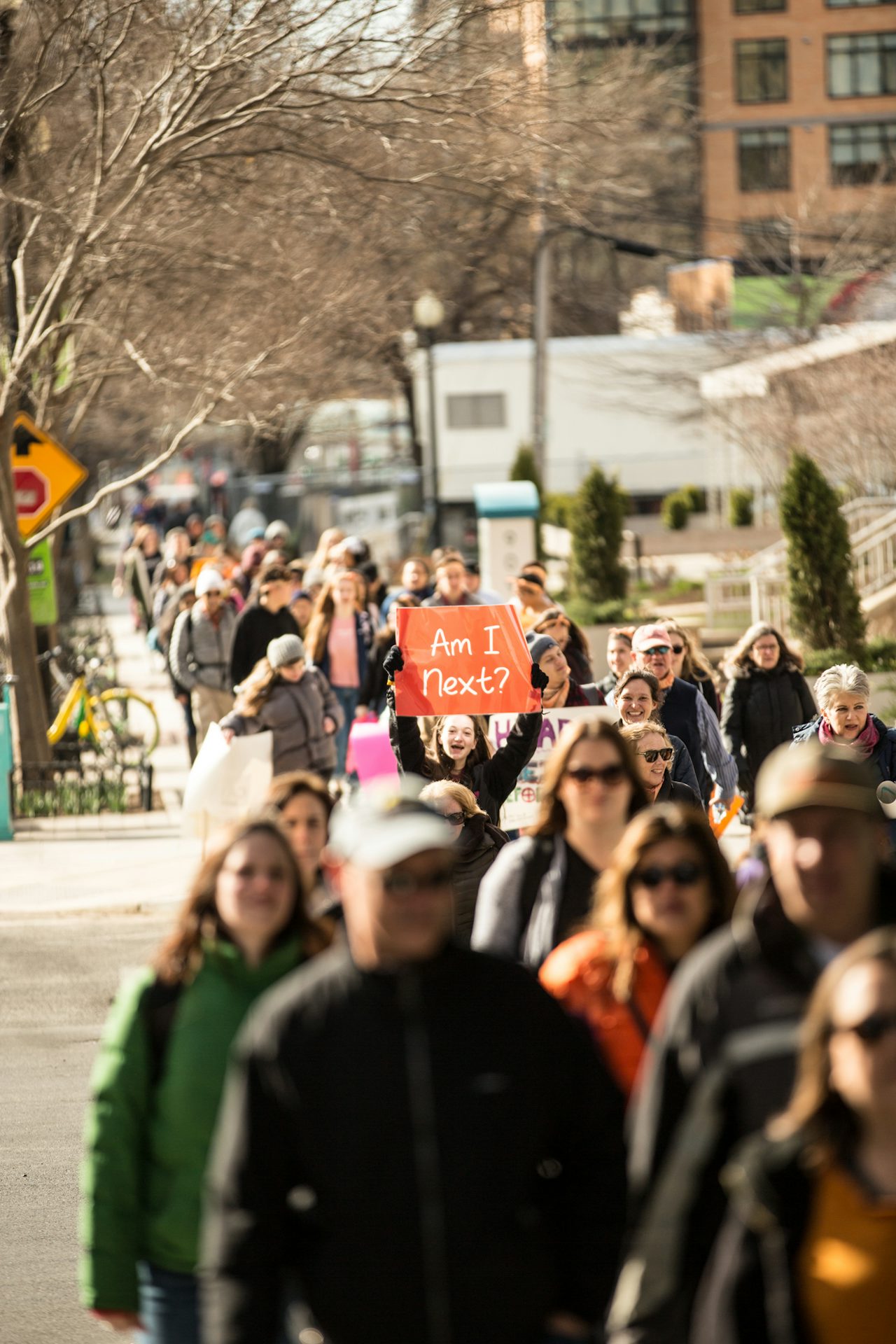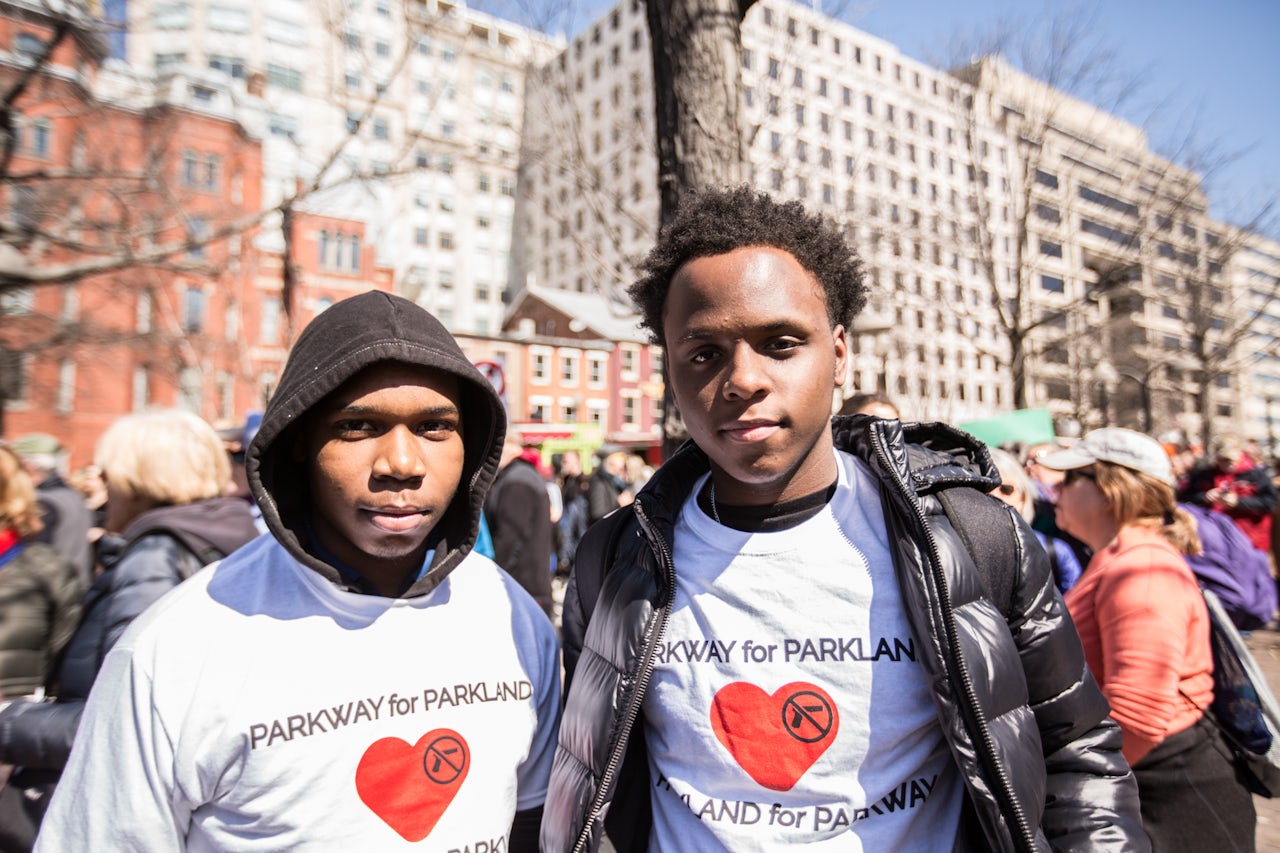Just four days after the mass shooting at Marjory Stoneman Douglas High School in Parkland, Florida, a small group of students decided to channel the nation’s collective outrage into a mass demonstration against school shootings.
The rally, which they called the March For Our Lives, was initially planned as a protest against the availability of semi-automatic weapons — and a call for more restrictive gun laws. But as the movement grew, the #NeverAgain rallying cry expanded to encompass myriad forms of gun violence in America. On March 24, an estimated 800,000 people gathered in Washington, D.C.. Speakers included survivors of the Parkland shooting, as well as Black Lives Matter activists and teenagers from low-income communities where shootings are a fact of daily life.
The Outline spoke to demonstrators about what brought them to Washington. Though they hailed from different backgrounds and locations, their lives had, in some way, been affected by gun violence. Some had survived school shootings; others lived in neighborhoods where gang violence was common. Many had lost friends or family members, and some of those who hadn’t knew someone who had. All of them were angry that firearms were so readily accessible in America, even after countless acts of violence.
Why are you here today?
Elijah: To get involved. We grew up around gun violence and we think it’s a problem in our society.
How has gun violence impacted your life?
Elijah: I’ve been shot at before and a lot of people around me have been killed.
Omar: I’ve been impacted by gun violence; I know a couple people who died — friends, family, people close to me. It affected me a lot.
Elijah: It can mess [people] up.
Why are you here today?
Vicki: I wanted to carry the names of the Parkland victims in this march and I wanted to be with all these wonderful kids who are soon going to be 18 and voting.
Cillamary: Likewise, I’m carrying the Sandy Hook victims. I wanted to be here to support the youth movement and [to make] an effort to protect our future children.
How has gun violence impacted your life?
Vicki: There was a shooting in a courthouse in Grand Marais a few years ago. I knew the victim, I knew the shooter, I knew his mother. It was horrifying. Life stopped until we found out nobody died. It was such a horror, because we all know each other in a small town.
Cillamary: I lived in South Minneapolis for years at the height of the gun violence era. In that way, I’ve been impacted. The only time I truly feel safe is when I go back to England to visit.
Why are you here today?
Tuamia: To support the movement.
Danielle: We’re all high schoolers and we all need to stand together in solidarity to support the ones affected.
How has gun violence impacted your life?
Danielle: My father, he was a victim of gun violence. He was murdered [when] I was 12. In my city, there’s always a lot of shootings. There’s always a lot of things on the news about how one person was shot, or one person is injured. It’s impacted me because it’s in my community.
Jasmine: My father was taken by a senseless crime. I had just turned six. So was my godsister. That had a toll on me — she was someone I looked up to, and she’s gone.
Why are you here today?
Emma: We’re here mostly because it sucks to go to school and think about the fact that there are people my age dying and living life in fear.
Clara: Most of my friends have immigrated here from El Salvador — they wanted to come here so they could escape that. Why should they [still] be living in fear?
Benjamin: Gun violence in the United States has become such an epidemic and [it’s] such a problem that it continues into our schools. Guns should never be in a place of learning.
Kirti: There are signs around here — I saw one that said, “Schools are for education, not assassination.”
Why are you here today?
I’m here, like everybody else, because I want this gun business to stop. I want there to be effective legislation passed that bans assault rifles and weapons of war. I wish it would be all guns, but that’s not going to happen. I’m marching here because I am from Newtown, Connecticut, and I am furious that this stuff is still going on and nobody’s doing anything about it. I want to spread the word about my friends’ foundation in honor of their daughter, Avielle — the Avielle Foundation.
How has gun violence impacted your life?
I’m from Newtown, Connecticut. I have very dear friends whose children were murdered. When that happened to our town — just like what happened in Parkland — it’s devastating. It’s beyond anything anyone can really imagine, unless it happens to them. There’s no way to describe what it’s like.
Why are you here today?
Alexandra: I’m a survivor of a mass school shooting in Quebec, Montreal, in 2006. After seeing the resilience of the Parkland survivors — how well-spoken they are and how composed and how they have such a strong message — I wanted to support my southern neighbors. And, as a human, try to prevent any other 17- and 16-year-olds from going through what I went through at their age.
How has gun violence impacted your life?
Alexandra: It’s been 11 years since the shooting happened for me. I know that the students right now, they have this adrenaline going with this movement; they’re focused on a message and a goal. But as a victim myself, I know that the trauma will eventually creep up to them. I suffer from severe PTSD to this day. Like many of the voices that we heard today, this will stay with you forever. It will cause a lot of pain — not only for you, [but also] for your family. It will be a lot of suffering.
Why are you here today?
Paul: I’m here to march against gun violence and to ban guns.
How has gun violence impacted your life?
Paul: Not myself. Gun violence isn’t so prevalent in the UK, because guns aren’t as available. In London, actually, I have a friend who was stabbed, so it’s [more of] a knife violence thing there.
Justin: I grew up in upstate New York, so mostly guns were used for hunting. But I really have seen the trend in a lot of schools, and I know people that have been personally affected by gun violence. In college, I was an RA. There was actually an active shooter at [my alma mater]. The college was on lockdown. That was... four years ago?
Paul: I’m here, actually, as an artist planting pansies at the sites of [homophobic hate crimes].
Justin: A lot of the victims of the hate crimes in DC that have been murdered — most of them have been due to gunshots.
Why are you here today?
Taylor: I’m here because I’m tired of seeing reports of murdered children on the news. I do not believe that anybody should own a semi-automatic rifle. I don’t believe it serves any purpose except to harm other people. There’s no self-defense aspect — [a gun is] a weapon designed to kill, and I do not believe that belongs in the hands of ordinary citizens. There’s also the issue of domestic abuse. The most likely place [where] a woman is going to be killed is in her home, by her own husband. You should not fear to be in your home; you should not fear to be at school. Those are the two safest places you should be.
How has gun violence impacted your life?
Cara: We had a small shooting in our county, at Frederick High School. Also the shootings in Maryland in general, and even on the national [scale] — all of it impacts us.
Why are you here today?
Patricia: I’m here to support these kids, who are finally doing something to challenge the status quo when it comes to gun laws. There’s no reason for anyone to have assault-style rifles or anything more than a shotgun or a small handgun for home protection.
Rodney: I’m proud military. I served. I handled weapons, and you’re only supposed to use them for war, period. Hopefully when they come to the next elections, a lot of these politicians are going to understand. [People] 18 years and over, they can vote, and they will [make a] change.
How has gun violence impacted your life?
Patricia: I have been involved in averting gun violence. Someone I know who owns an assault rifle who was being threatening — I reported it and did what I could, went to court, got a court order for a 72-hour psychiatric evaluation. I hope my actions prevented something tragic from happening.
Rodney: Take a look at Black Lives Matter. With BLM, you don’t have kids killed in school — you have kids killed in the street. And the police — they protect each other. With the movement for gun control, you’ve also got to look at police control.
Patricia: When I was in Texas studying anesthesiology, it was weekend after weekend — these young kids coming in with gunshot wounds. Some of them [were] from fights — but many of them were [from] accidental shootings. At least with the bullets from the little handguns, patients had a chance to survive. The weaponry they’re using these days — one gunshot, one bullet — it does so much damage. This was in the ’80s. There were no AR-15s on the street in the ’80s.
Why are you here today?
I’m here to fight for all the kids out there who are losing the opportunity to be free. We’ve got to call out the NRA, we’ve got to vote, we’ve got to do all we can to protect the kids.
How has gun violence impacted your life?
I haven’t had to deal with that — I haven’t been in that spot. But knowing that there are so many kids out there being hurt — so many families having to deal with their kids losing their lives… I mean, every once in a while I walk around school and wonder: This could happen to me. This could happen at my school. And what would we do? There’s nobody here to protect us.














